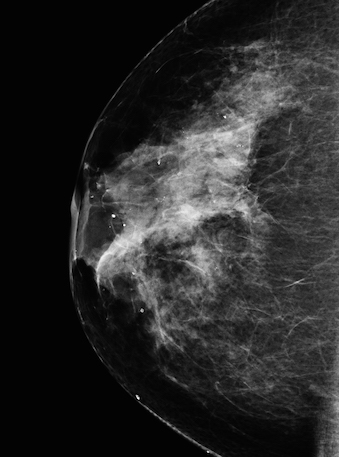Machine Learning (ML) is a technique to train computers to identify patterns instead of explicitly telling them what those patterns are. If you want to teach a machine-learning system to recognize a cat, you don't tell it to look for whiskers, ears, fur, and eyes. Instead, you show it many thousands of photos of cats and eventually the system will identify the characteristics that define a cat on its own.

This is a Cat
While identifying cat photos seems like a trivial goal, the same approach can be used across many important domains. Instead of identifying cat photos, machine learning could be used to identify breast cancer in the imagery generated during a mammogram. Beyond image recognition, machine learning has also been used for natural language processing, speech recognition, and predictive analytics, among other tasks.

This is a Mammogram
Many companies are successfully deploying machine learning in both the consumer and enterprise spaces. Google uses machine learning image recognition to improve Google Maps. Amazon uses it to understand spoken commands given to its Echo / Alexa product. IBM has unified their machine learning work under the brand Watson and is applying it to an ever increasing number of business problems.
There has been a large amount of research done to apply machine learning to health care, but much of it is stuck in an academic setting, or buried in journals without any real-world deployments. An ambitious health care company could be in a unique position to harness the power of machine learning through the deployment of these techniques, providing great benefits to their patients.
Where could a provider start applying machine learning?
- Cancer staging from unstructured EMR data[1]
- Cancer diagnoses from imagery[2]
- Disease progression from EMR data [3]
- Finding early indications of relapse [4]
These are only a few place where providers could begin exploring machine learning. While some of these projects might need partnerships with external institutions or vendors, a provider could start with the data they already have. Machine Learning is going to have a large impact on cancer care.
- ReCAP: Feasibility and Accuracy of Extracting Cancer Stage Information From Narrative Electronic Health Record Data
- Predicting non-small cell lung cancer prognosis by fully automated microscopic pathology image features
- Inferring a Patient's Disease Trajectory and How to Modify It
- Study Finds Use of Mobile Web App Associated With Improved Outcomes in Lung Cancer Note: while this particular app doesn't use machine learning, machine learning could help attempt similar goals by analyzing the vast data sets created by wearable devices